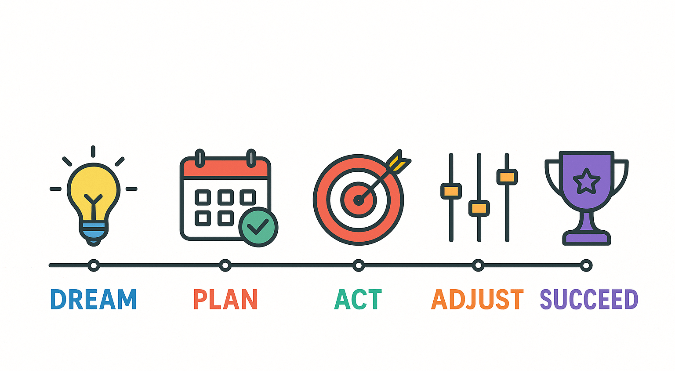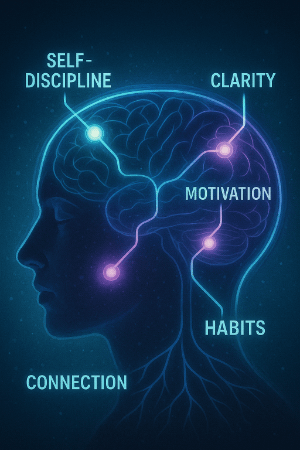Ever found yourself setting goal after goal, only to feel more exhausted and less inspired as time goes on?
It’s pretty common—goal fatigue is a real thing.
In fact, a 2023 study by Asana found that over 70% of people reported feeling overwhelmed by their task lists, especially when they tried to tackle too many directions at once.
Finally Finish What You Start
You don’t need more information. You need the accountability to execute.

Why Some Goals Matter More Than Others
Not all goals are created equal—some fuel real progress, while others just drain your energy.
Goals that match your values, support your personal growth, and push you forward in areas like your career, your business, financial health, or wellbeing are the ones that make a real difference.
The rest—those vague, borrowed, or trend-driven goals—tend to create more stress than progress.
In this article, we’ll dive into the types of goals that actually move your personal and professional life forward—and which ones just sap your energy.

The Problem with Traditional Goal Setting
If you’ve ever waded chest-deep into the sea of goal setting advice, you know how easy it is to feel unfocused.
Most people try to “set goals” in every area—fitness goals, financial goals, a new social media campaign for their business, the works.
The truth? Not all goals are created equal.
Some types of goals are essential stepping stones; others are just shiny distractions that end up draining your motivation.
Here’s the kicker:
- Some goal types are the real engine of progress
- Others are nice-to-have but optional
- A few are pretty much outdated distractions (I’m looking at you, “run a marathon because my Instagram friend did”).
Let’s break down the ones that matter.
The 7 Types of Goals That Actually Matter
1. Process Goals: Why Systems Beat Willpower
First up, let’s clear the air between process oriented goals and outcome goals.
Process goals are all about the actions you take regularly—think “write for 30 minutes every day” rather than “write and publish my first book by December.”
By setting process goals, you shift your focus to what you can control in the moment.
Here’s why that works: When you zero in on the process, you build momentum and develop habits that stick around—no more willpower burnout at the five-week mark.
The sustaining power of these goals makes them a vital part of any effective goal setting method (learn more about this idea from James Clear’s breakdown of systems vs. goals).
2. Long Term Goals: Your Future Depends on Them
You can’t get where you’re going if you don’t have a finish line in mind.
Long term goals—anything from one year to a decade out—anchor your vision and give your goal setting process real direction.
These goals can be personal, like finishing a master’s degree, or professional, like running your own business with a strong customer retention rate.
The secret is to avoid falling into the “someday” trap. That means breaking those big picture dreams into smaller, time bound milestones so you actually track your progress year after year.
3. Professional Goals: Invest in Your Career Identity
Want to feel confident and grounded in your professional life? Set professional goals that nurture your career—whether you’re a freelancer, business owner, or part of a bigger organization.
Think of goals like boosting your leadership skills, launching new income streams, or stepping up for your team’s goals.
And don’t forget to make your professional goals SMART (specific, measurable, achievable, relevant, and time bound)—it’s still the gold standard for keeping your ambitions practical (see how to write more effective SMART goals).
4. Intellectual Goals: Grow or Stay Stuck
If you’re not moving forward, you’re probably stuck in “mental autopilot.” Intellectual goals challenge your brain, boost creativity, and keep you interested in life.
This could mean carving out time for reading, pursuing new skills, or setting ambitious goals for formal education like tackling academic goals with a structured approach.
A steady flow of intellectual stimulation makes it easier to stay motivated. Even mini goals—like finishing one new book a month or attending a free class—can stretch your thinking and give you short term objectives that keep you sharp.
5. Spiritual Goals: Values That Guide the Rest
Spiritual goals aren’t just about religion. They’re really about meaning, growth, and living in alignment with your values.
Maybe it’s daily reflection, writing in a gratitude journal, or doing a monthly day of community service as a family member.
During stressful times, these kind of goals help you maintain a core sense of identity and purpose—even as external factors shift around you.
Psychology Today explains how values-based goals can positively impact both mental health and resilience.
6. Business Goals: Vision, Growth, and Impact
Every thriving company—big or small—has clear business goals.
These might include boosting revenue, building systems for innovation, and growing your client list (or launching that social media campaign without losing sight of the bottom line).
But here’s where many people get tripped up: They confuse busy work with actionable goals. Being results-driven means focusing on outcome oriented goals (like measurable increases in customer retention), not just “doing more.”
Use the SMART framework to keep business goals grounded and actionable (see Forbes’ take on setting effective business goals).
7. Life Goals: Your Personal Definition of Success
What do you want your life to actually feel like?
Your life goals are the “north star” that guide every other category of ambition, whether that means better physical health, deeper relationships, creative freedom, or more time for family.
When you set goals in this bucket, they give you the overall direction you need, making sure all the other goals serve the big picture.
Life goals anchor your identity and help you prioritize what’s truly important in every area of your life.

The 5 Types of Goals You Can Probably Skip
1. Copy-Paste Goals from Social Media
You know those goals you swipe from an influencer’s “Morning Routine for Millionaires” post? Most don’t stick—because they’re not connected to your reality. Chasing aesthetic or validation-based goals will wear you out faster than a TikTok trend.
2. Vague Bucket List Goals Without Meaning
“If I just put ‘travel more’ and ‘be healthier’ on my list, things will magically fall into place.” Spoiler: They won’t—unless you add context, clarity, and deep personal relevance.
Without these, vague goals won’t give you the sustained effort or focus you need to achieve your desired outcome (why clear goals are key, via PositivePsychology).
3. Goals That Don’t Match Your Season of Life
Ambitious goals are great… unless you’re in a season where your bandwidth is already maxed out.
If you just had a new baby, now might not be the moment to launch a new business or train for an Ironman competition. Pick goals that fit the actual time and energy you can spend.
4. Ego-Driven Professional Milestones
It’s all too easy to get stuck chasing promotions, awards, or shiny “LinkedIn titles” that don’t align with your own values (or happiness).
If a goal only serves your ego, it’s likely a distraction from the goals that really move you forward—in both your personal and professional life.
5. Trends Disguised as Goals
Every year there’s a new viral money challenge, productivity hack, or “biohacking” routine. But adopting every trend fragments your focus and pulls you away from your own big picture. The best goals are aligned with your season, not what’s trending on Reddit.
What Makes a Goal Worth Pursuing
So, how do you decide which types of goals are worth your time? The answer is a mix of realism, meaning, and personal alignment.
A good goal should feel both actionable—broken down into steps you can actually take—and truly matter to you.
Quick tip: The SMART framework isn’t just for your annual review. Use it selectively, to make sure your goals are Specific, Measurable (hello, quantitative goals), Achievable, Relevant, and Time bound.
For example—don’t just set a fitness goal like “exercise more.” Choose something clear, like “do 20 minutes of strength training, three days a week.”
According to an extensive study by Dr. Gail Matthews, people who wrote down their goals and shared them with a friend were 33% more likely to achieve them. Write them, share them, and track your progress—it really works.

Why Realistic Goals Are the Ingredient You Can’t Skip for Success
Let’s talk about realistic goals—the unsung heroes of actually achieving goals, not just dreaming about them.
I get it. You want to swing for the fences, set audacious career goals, or double your financial goals by next quarter. (Who doesn’t?) But here’s the thing: if your goals are so out-there that your subconscious starts chuckling every time you mention them, you’re setting yourself up for disappointment.
Realistic goals strike the sweet spot between ambition and achievability. They push you, but not so much that you stall out—or worse, burn out.
It’s like planning to run your first marathon, but starting with a 5K. You build up your endurance and, more importantly, your belief that you can actually do it.
When you set goals that are grounded in your current reality—think of your available time, resources, skills, and support—you create a path that feels doable.
That doesn’t mean you’re playing small. It just means your “big leap” is built on a bridge of mini jumps (hello, short term goals), not a leap of blind faith.
Here are a few practical ways to put realistic goals into your own strategic planning:
- Break tough targets into smaller performance goals. Instead of “triple my income by next month,” reframe it as “add two new clients this quarter”—a solid, actionable step for your financial goals.
- Consider your personal life demands. Got kids, a side hustle, or limited bandwidth? Adapt your goal-setting so you’re not sacrificing your physical health for the sake of hustle.
- Use honest self-assessment. Look at your resources, track record, and time realistically before committing. If your track record is more “start and stall out” than “finisher,” adjust that goal post.
Realistic goals empower you to make steady, measurable progress in every area—from career goals to personal growth, and even those big financial goals you’re itching to tackle. You’ll earn those quick wins that boost momentum (thanks, short term goals!) and lay foundation for bigger ambitions down the line.
In my coaching, I’ve seen that nothing derails personal growth faster than biting off more than you can chew. Trust that a realistic roadmap—complete with strategic planning and maybe a few recalibrations along the way—gets you much closer to actually achieving goals.
Exploring the Different Types of Goals (And Why It’s Smart to Mix Them)
Here’s the truth: if you only focus on one type of goal, you’re missing out on the full spectrum of impact. Think of your life like a pie chart (mmm, pie)—your career goals, financial goals, physical health, and personal life all deserve a slice.
Mixing up different types of goals keeps things balanced, adaptable, and a lot more rewarding in the long run.
So, what are the different types of goals you can set—and how do they fit into your quest for personal growth and strategic planning? Let’s dig in:
- Performance Goals: These are all about raising your game, whether you’re aiming to increase your sales targets or shave a minute off your 5K. They’re perfect for adding structure and clear metrics to your career goals (like “earn a promotion in the next year” or “deliver presentations without freezing up”).
- Financial Goals: Money may not buy happiness, but it sure pays the bills. Financial goals—like paying off debt, saving for a home, or starting a side income—can transform your personal life. Aligning these with your long-term vision (and setting some realistic milestones) is strategic planning at its best.
- Short Term Goals: These are your quick wins. Need to boost motivation? Pick a short term goal you can achieve in the next few weeks. It might be “complete an online course,” “reduce daily screen time,” or simply “get to bed by 11 p.m. all week.” (Don’t underestimate the sense of victory in hitting these targets!)
- Long Term Goals: The big, audacious ones—think “run a marathon,” “launch a business,” or “reach financial independence.” These need to be broken down and paired with smaller goals so you don’t get stuck in dreamland.
- Personal Growth Goals: Ah, the secret sauce. Whether it’s learning a new skill, reading more books, or practicing mindfulness, these goals add joy and meaning to both your career and personal life. They’re proof that the journey matters, not just the result.
Here’s the bottom line: Strategic planning works best when you set goals across different categories. Focusing on diverse goals keeps you energized, taps into all areas of personal growth, and helps you build resilience—because when one area gets rocky, you’ve still got momentum elsewhere.
And hey, life isn’t a one-track race. The best progress happens when your health, finances, career, and self-worth are all moving in harmony. If you ever feel off-kilter, just reassess which types of goals need some extra love right now.
So next time you’re mapping your next steps, remember: Set goals that hit every slice of your personal pie. That’s how you stay balanced, motivated, and on track—not just for hitting individual milestones, but for truly achieving goals that make your whole life better.

A Quick Framework for Choosing Your Top 3 Goal Types
Ready for a fast exercise to cut through the clutter? Here’s a worksheet approach:
- Choose 1 Process Goal—What daily or weekly action will move you forward (like reading, journaling, or regular outreach in your professional life)?
- Choose 1 Long Term Goal—What’s your top 1–5 year outcome goal? Maybe it’s earning your master’s degree, reaching financial independence, or starting an own business.
- Choose 1 Life or Career Goal—What do you want your life or work to feel like, at its best? Is this your year to double down on family goals, fitness goals, or building leadership skills?
Match these types of goals to the areas of your life that need the most attention right now. You’ll get a list of actionable steps, that makes sure you’re on the right track—without overloading your plate.
Takeaway: Choose Goals That Add Energy, Not Just Effort
At the end of the day, the most effective types of goals are those that align with your current reality, build meaning, and fuel your growth.
Forget the ones that just add to your sense of overwhelm—double down on clarity, focus, and what truly matters for your personal and professional journey.
Ready to cut the clutter? Remember: It’s not just about adding effort. It’s about adding energy and joy to the big picture of your life.
Want Help Building Better Goal Habits?
Book a Complimentary Strategy Session
- Together, I’ll review your top goals with you and we’ll map out some actionable steps for real progress.
- You’ll leave with confidence and a custom plan to achieve your goals—no more spinning your wheels.
Book your complimentary coaching call here. It’s not a sales call. The focus is on giving you value and it’s a good chance to see if coaching might be a good fit for you or not. If you have any questions, feel free to get in touch.
FAQ: Types of Goals and Goal Setting
What are the most common types of goals?
The most common types of goals include process goals, outcome goals, performance goals, long term goals, short term goals, professional and personal goals, financial goals, and life goals. Each type serves a unique purpose, from daily habits to big picture dreams.
How do I know which types of goals to focus on?
The best types of goals are those closely tied to your current priorities and available resources. Check in with your values, season of life, and overall direction—then pick goals that energize rather than drain you.
What’s the difference between process oriented goals and outcome goals?
These goals are about the actions you take (like “study for 30 minutes each night”), while outcome oriented goals focus on the desired outcome (such as “get straight A’s this semester”). Both are important, but process oriented goals offer more opportunities for sustained effort.
Can spiritual goals be practical?
Absolutely! Spiritual goals anchor you during uncertainty by reinforcing your values and providing a sense of meaning. Whether it’s a daily gratitude practice or mindfully connecting with your community, these goals can support both your mental health and personal growth.
Do I need both short-term and long-term goals?
Yes—for real progress, you need both. Short term goals create momentum and quick wins, while long term goals give you something larger to move toward. The combination keeps you focused as you achieve your goals, step by step.
Resources for Smarter Goal Setting
- Atomic Habits by James Clear
A bestselling book that teaches how tiny, consistent habits can lead to big goal achievement—ideal for process-oriented goals. - Notion
A flexible digital workspace where you can organize goals, track progress, and integrate journaling, vision boards, or action plans—all in one place. - The ONE Thing Podcast
Hosted by the authors of The ONE Thing, this podcast explores how to prioritize what truly matters across work and life. - Michael Hyatt’s Full Focus Planner
A paper planner and system designed to help professionals set goals, structure their weeks, and track what matters most.






